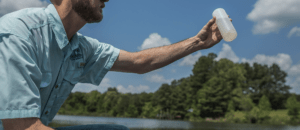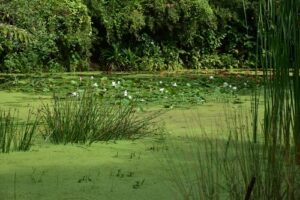By Matt Ward
Water health needs to be managed just like fish and plant life health. In the first of these posts about water quality, I discussed the issues of water turbidity and nutrient control, both critical issues for a healthy fishery.
This week we’ll take a look at water alkalinity and hardness, two more pond water testing factors to be aware of as you look to maximize the health of your lake or pond.
Alkalinity
All lakes and ponds experience daily fluctuations in pH and this fluctuation can put stress on fisheries which in certain cases can lead to lower productivity or even minor kills.
Alkalinity is a measure of your waterbody’s ability to buffer (read “stabilize) natural daily pH swings and will certainly contribute to primary productivity (which ultimately results in gamefish biomass). Alkalinity is generally raised by adding agricultural lime to a pond or lake.

In general, alkalinity should be maintained above 25 mg/mL but would best be maintained in the ideal range of 50-200 mg/mL.
That being said, some lake’s watersheds are so large or lake subsoils so acidic that it is impractical to adjust alkalinity. In these cases costs and benefits will need to be weighed and other sources of productivity (like pelleted fish food) will need to be considered to promote good productivity in a fishery.
Also, lower water quality in the form of lower alkalinity can be better tolerated by certain fish species. Know your water’s alkalinity, adjust it if you can, and then work as best as you can with what you have.
Interestingly, I have noticed that alkalinity seems to be less and less of an issue as more and more ag lime has been applied to pastures especially across the eastern half of the state. This agriculture effort has certainly improved water quality in a large number of private fisheries.
Hardness
Hardness can be simplified to approximate the calcium content of a given water body. Fishery management is best served by adjusting hardness to promote good fish growth. Calcium is important for the development of bone and shell in living organisms and minimum levels are needed to promote their formation. Ideal hardness would be in the 50-200 mg/mL but again, the practicality of adjusting hardness should be weighed against the cost to do so.
To raise hardness you can add gypsum or agricultural lime to a given lake. In lakes with adequate or even high alkalinity, but low net hardness, hardness can be raised without affecting alkalinity by adding gypsum. If hardness and alkalinity are both low, just add ag lime. In lakes where water quality amendments are impractical, consider that fish can obtain calcium from their food.
A Note on Vegetation and Algae
Interestingly, hardness and alkalinity also affect vegetation and algae growth in significant ways.
 Though most fishery managers think of water quality management as a tool to boost fish production, water quality parameters sometimes need to be manipulated to promote shifts in aquatic plant and algae communities to better support existing fisheries.
Though most fishery managers think of water quality management as a tool to boost fish production, water quality parameters sometimes need to be manipulated to promote shifts in aquatic plant and algae communities to better support existing fisheries.
Minding water quality
Water quality involves a variety of factors that must be considered in fishery management and lake and pond management. We haven’t covered all the different things that you might need to consider but hopefully this discussion has given you some food for thought. When fisheries don’t perform the way we expect them to, consider pond water testing and get some professional advice. Your fish will thank you.
Why Choose Lochow Ranch for Pond & Lake Management
Serving Texas, Oklahoma, Arkansas and Louisiana, Lochow Ranch Pond & Lake Management proudly puts more than two decades of experience to work for you. Our team includes biologists, technicians and other professionals with deep expertise in pond and lake management services.
Check us out if you are considering building a lake, looking for pond stocking services, to buy fish for a pond, or getting professional pond management and maintenance or fishery management. Our services include lake design, pond construction, pond renovation, pond water testing, electrofishing, pond stocking, control of pond weeds, and pond liming and fertilizing. Let us help you build your dream pond that will delight your family and friends for generations to come.
Click here to get in touch to get started today.
Matt Ward is a Fishery Biologist for Lochow Ranch Pond & Lake Management. He has a Master of Science in Biochemistry from Texas A&M University and has worked in fisheries management in Texas for 15 years. He brings a passion for good science and an interdisciplinary approach to the natural sciences to help property managers steward their aquatic resources and achieve management objectives.

Recent Comments